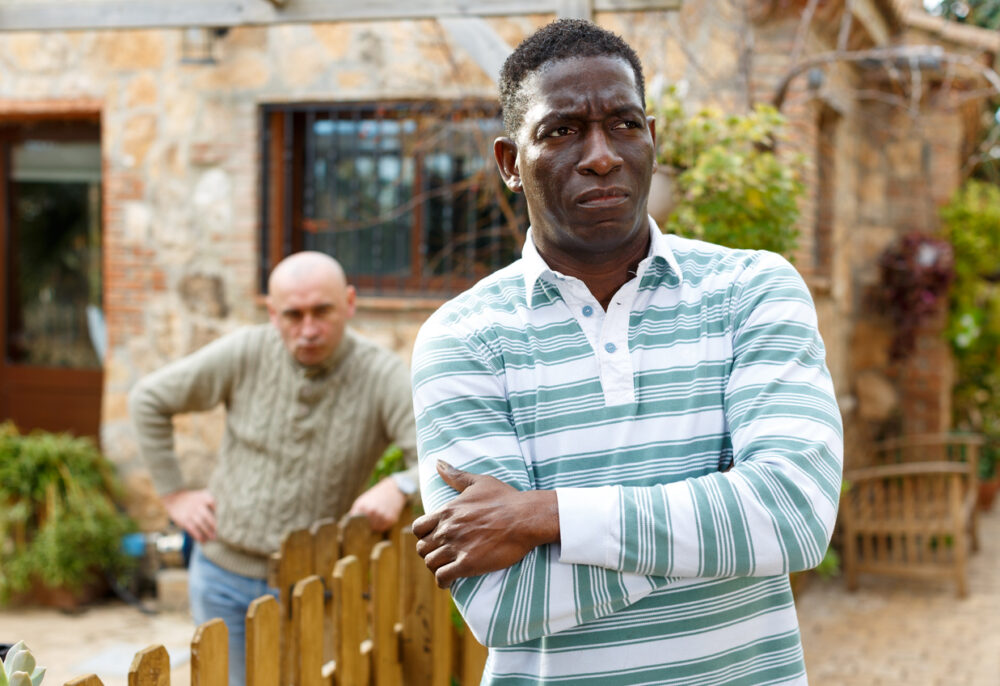We’re all online but lonelier than ever—and it shows in the little things.

Holding eye contact feels like a lost art. Striking up small talk seems more terrifying than skydiving. And somehow, asking a stranger for help in public has started to feel like a breach of social protocol. These moments used to be part of everyday life, but now they spark tension, hesitation, and that all-too-familiar awkwardness that makes people pull out their phones or pretend they’re busy.
It’s not that we’ve lost the ability to connect—we’ve just gotten rusty. Technology, isolation, and modern habits have quietly reshaped how we relate to each other. Genuine interactions feel unfamiliar, even uncomfortable, and it’s starting to show in subtle but telling ways. These ten moments expose how disconnected we’ve become and how badly we need to re-learn the basics of being human together.
1. Saying hello to neighbors now feels like overstepping.

Once upon a time, saying hi to the person across the street was expected. Now, it can feel borderline intrusive. People lower their heads, avoid eye contact, or give a quick nod before speeding back into the safety of their own world. The idea of friendly small talk on the sidewalk is becoming increasingly rare, according to Jon Tyson at HubPages.
The shift isn’t about hostility—it’s about social habits changing. With everyone buried in their devices or rushing through their day, spontaneous connection feels out of place. But when simple greetings become awkward, the invisible walls between us grow taller. Relearning how to casually acknowledge each other might be a small act, but it’s one that can soften a disconnected world.
2. Pauses in conversation feel unbearable for most people.

A lull used to be a natural part of chatting. These days, silence makes people squirm. They rush to fill the gap with nervous laughter, random facts, or by grabbing their phone to escape. It’s like we’ve collectively forgotten that quiet moments are allowed.
That pressure to keep talking nonstop makes every interaction feel like a performance, as reported by Michele DeMarco Ph.D. at Psychology Today. But connection doesn’t happen through constant noise. It builds during the breathing room between words—the space where people gather their thoughts or sit comfortably with one another. We’ve started treating silence like failure, instead of a normal and even meaningful part of real communication.
3. Asking for help in public now feels weirdly vulnerable.

Even something as small as asking for directions or help reaching a shelf can feel intimidating, as stated by Manfred F.R. Kets de Vries at Harvard Business Review. Many people will circle a store ten times before approaching another human. It’s easier to Google something on your phone than risk an awkward encounter with a stranger.
This avoidance isn’t about pride—it’s about losing confidence in casual human exchanges. We’re out of practice, and that makes us self-conscious. But when we stop depending on each other for small things, we also lose out on those spontaneous interactions that remind us we’re not alone. Connection starts with tiny moments of shared humanity, not just perfectly planned conversations.
4. Complimenting someone in person can feel like crossing a line.

Saying something nice used to be a kind gesture. Now, people second-guess every compliment, wondering if it will be misinterpreted or make things uncomfortable. Even telling a coworker their haircut looks good can suddenly feel risky.
While it’s important to be respectful and mindful of boundaries, we’ve overcorrected in some cases. Genuine appreciation has become another casualty of social anxiety. That hesitation steals small chances to uplift each other. We don’t need to smother people with flattery—but learning how to give and receive compliments again might help revive a little warmth in daily life.
5. Making phone calls feels like a high-stakes event.

The simple act of calling someone has turned into a source of dread. People screen calls, send texts instead, or avoid answering altogether—even with friends. Talking live feels too intimate, too exposed, or just too much work compared to sending a quick message.
It’s not that people hate connection—they’re just used to curating their responses on their own time. But voice-to-voice conversations offer a richness that texts can’t replicate. They carry tone, nuance, and spontaneous energy. Avoiding calls may protect us from discomfort, but it also limits our ability to really connect beyond a screen.
6. Group hangouts feel harder to navigate than ever.

Once a staple of social life, group settings now feel emotionally exhausting for many people. It’s easy to get stuck in your own head, wondering how you’re coming off or feeling like you don’t quite belong. Even with people you know well, the vibe can feel strangely off.
Much of this stems from spending more time alone or behind screens. The dynamic energy of real-life interactions takes practice. Without it, our social muscles weaken. The more we avoid these situations, the less comfortable we feel in them. Rebuilding that ease starts with showing up, even if it’s a little awkward at first.
7. Waiting in silence next to others now feels unbearable.

Elevators, waiting rooms, and checkout lines used to be full of light chatter or quiet companionship. Now, everyone’s glued to a phone. The idea of striking up conversation—or even just existing silently next to someone—feels strangely intense.
Phones offer an easy out, a shield against interaction. But they also steal opportunities to notice each other, share a moment, or simply coexist in the same space without awkwardness. When silence between strangers becomes a source of tension instead of comfort, it shows how disconnected we’ve become—even when we’re standing inches apart.
8. Flirting in person has turned into a lost art.

Flirting used to be subtle, playful, and full of charm. Now it’s either avoided completely or replaced by awkward DMs and dating apps. The idea of making a lighthearted, respectful move in real life can feel paralyzing.
It’s not just about romance—it’s about risk. Face-to-face interaction offers no buffer, no edit button. So many avoid it entirely to sidestep the possibility of rejection or embarrassment. But flirting is a dance that teaches confidence, timing, and empathy. Without it, relationships begin in fear instead of fun, and that changes everything.
9. Eye contact feels more like confrontation than connection.

Looking someone in the eye used to signal interest, trust, and presence. Now it often triggers discomfort. People glance away quickly, check their phone, or stare into the distance to avoid locking eyes—even in conversation.
This reflex might protect our emotional space, but it also shuts down intimacy. Eye contact is a cornerstone of human connection. It builds safety, signals honesty, and anchors you in the moment. Losing that habit weakens our ability to be fully present with one another, and that absence is felt, even if we don’t consciously name it.
10. Saying goodbye in person often ends on an awkward note.

Hug? Handshake? Wave? People hesitate and second-guess how to end social interactions now. That lingering uncertainty makes goodbyes feel clunky and tense, even between friends. It’s like we forgot how to wrap things up naturally.
These small rituals used to be second nature. They offered closure, warmth, and a sense of rhythm. When even saying goodbye feels awkward, it’s a signal that we’ve lost touch with the flow of human connection. Rebuilding it isn’t about rehearsing perfect exits—it’s about relaxing into each moment, no matter how ordinary it seems.
